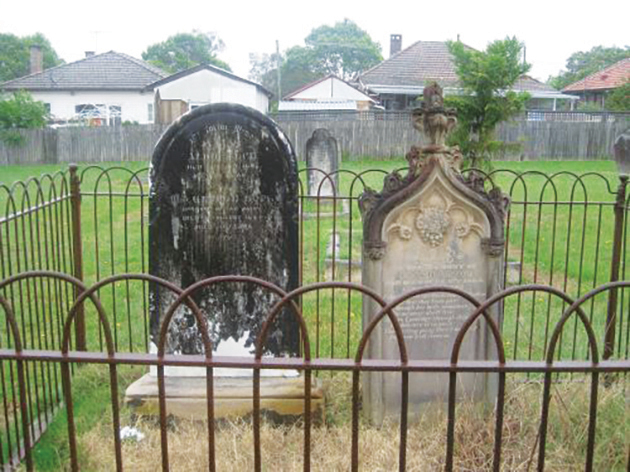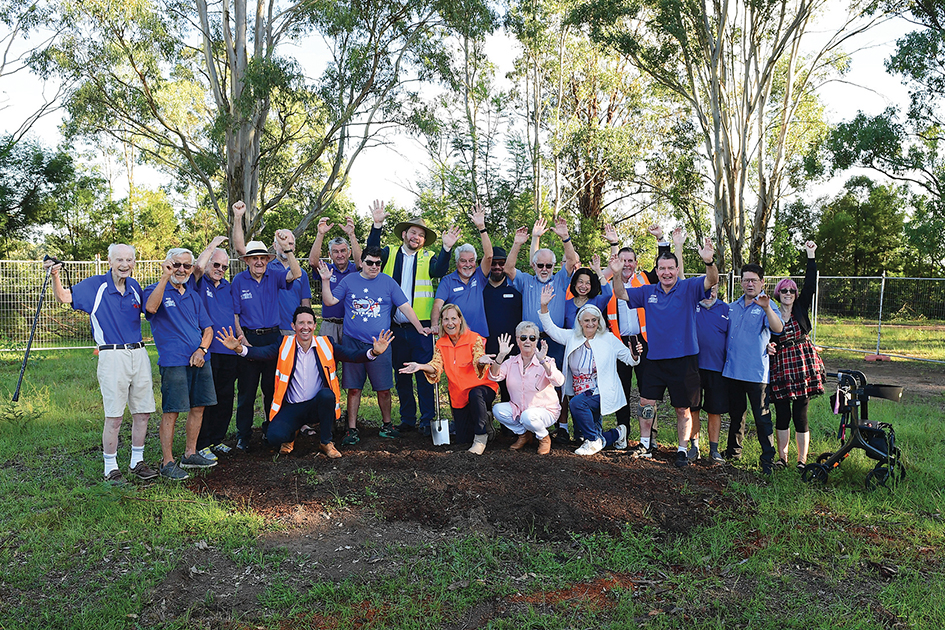Photo of graves courtesy of Ancestry website.
By Lyn Forde – President/Research Officer of St Marys & District Historical Society Inc.
George Hope was born at Ainsworth, Lancashire in England on 12th January 1815. He married Alice Hunt on 15th September, 1839 and they came to Australia in the “Clyde” on the 21st April 1840 and George worked for Sir John Jamison at “Regentvilla”. Later with his wife Alice they settled at Castlereagh as farmers, but when the O’Connell grant of “Frogmore” at Werrington was being sold in the 1850’s George purchased a 50-acre allotment bounded partly by the Werrington Road, the present railway line and the Western Road (highway) that he named “Hopefields”. The farm was later known as “Hope Farm” on Quarry Hill at Werrington and was later bought by William Garner the first Mayor of the St Marys Municipal Council. In July 1850 in the Court of Requests at Penrith with regards to the singular decision of the Commissioner on the petition of George Hope who wrote a letter to the Editor of the Sydney Morning Herald saying “Sir, I think it right to make public to the people, a decision of the Commissioner of the Court of Requests at Penrith as one seriously involving the just and equitable rights of claimants in that Court. Some time ago a neighbour’s pigs got among my crop of potatoes and consumed and otherwise destroyed them. My wife Alice in my absence drove the pig’s home to their owner who said that they were his pigs, and on the same day he came and looked at the damage done. When the case came up for adjudication before the Commissioner at Penrith, he would not hear the evidence of my wife and dismissed the case because I did not happen to see the pigs on my crop myself (and my wife did) and I did not drive them home to their owner, that of course, I could not do. You will observe the defendant (neighbour) acknowledged the pigs to be his property and the damage they had done, and conscientiously admitting his liability he was most anxious to settle the matter rather than go into Court, but I would not take less than the amount I claimed and did not cover the damage done by one-half. I will particularly be obliged if you would inform me through the medium of your paper whether this decision of the Commissioner is strictly in accordance with the Court of Equity and conscience, and whether a quibble of law has not been mixed up with the case, upon which alone the decision would appear to have been pronounced. Yours – George Hope”. The answer came in the Sydney Morning Herald on the 18th July, 1850 saying “The English legal system was introduced to Australia through colonisation. Upon arrival to Australia the colonists declared that the laws of England were to immediately apply to all settled lands. This declaration was asserted by reliance upon a legal fiction that the Australian continent was terra nullius; i.e. land belonging to no one, as it was believed that the Aboriginal peoples already inhabiting the continent were not cohesively organised for a treaty to be struck with any single representation of their peoples. Under the conventions of international law at the time, terra nullius lands were recognised as immediately adopting the laws of the relevant colonial power. The arrival of English Law was later expressly stated in statute by passage of the Australian Courts Act 1828. The act stated that all laws and statutes in force in England at the date of enactment should be applied in the courts of NSW and Van Diemen’s Land (Tasmania) so far as those laws were applicable. The earliest civil and criminal courts established from the beginnings of the colony of NSW were rudimentary, adaptive and military in character. Although legality was not always observed, the courts limited the powers of the Governor and the law of the colony was at times more egalitarian than in Britain. By 1824 a court system based in essence on the English model had been established through Acts of the British Parliament. The New South Wales Act 1823 provided for the establishment of a Supreme Court with the power to deal with all criminal and civil matters “as fully and amply as Her Majesty’s Court of King’s Bench, Common Pleas and Exchequer at Westminster”. Inferior courts were also established, including courts of General or Quarter Sessions, and Courts of Requests. Representative government emerged in the 1840s and 1850s, and a considerable measure of autonomy was given to local legislatures in the second half of the nineteenth century. Nevertheless, Acts of the United Kingdom Parliament extending to the colonies could override contrary colonial legislation and would apply by “paramount force”. George died at St Leonards on the 31st August 1893 at the age of 78 and Alice born in 1814 in Lancaster died at St Marys on 16th September 1892 aged 76 and both are buried at St Stephen’s cemetery, Penrith.






